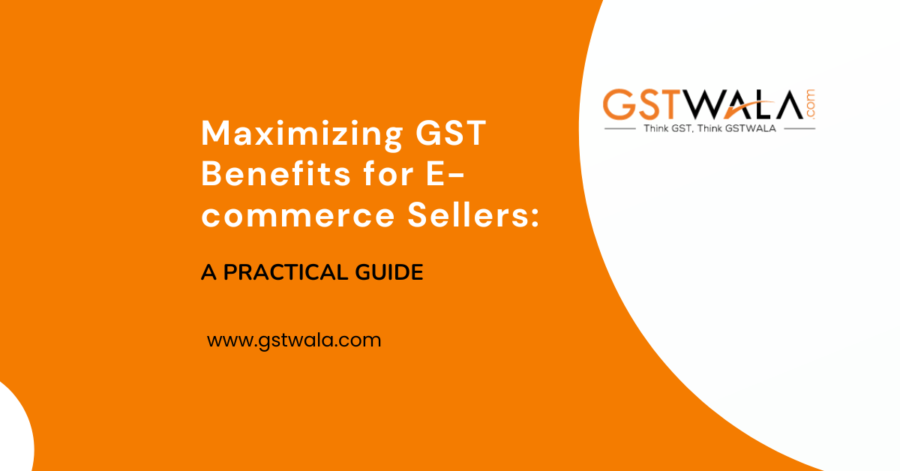
Maximizing GST Benefits for E-commerce Sellers: A Practical Guide
In the enchanting labyrinth of Goods and Services Tax (GST) benefits awaiting those who traverse the digital highways of e-commerce, we embark on an odyssey to uncover the treasures that lie in wait for registered entities. Before we unfurl the majestic tapestry of advantages bestowed by the law, let us first traverse the terrain of a quintessential transaction, a microcosm of the vast cosmos of commerce within the digital realm.
Behold M/s. ABC Limited, a beacon of enterprise, ensconced within the virtual realms of Amazon, where goods of unparalleled allure are offered to discerning customers. In this celestial dance of commerce, the price of the wares stands at a princely sum of Rs. 1050, a testament to their intrinsic value and the tender embrace of GST, which bestows upon them a mystique of legitimacy and grandeur. Within this sacred transaction, the gods of commerce decree that Rs. 1000 be bestowed upon the sanctified realm of the base price, while an ethereal whisper of Rs. 50 emerges as the sacred GST component, a tribute paid to the cosmic forces of taxation. As the cosmic wheels turn, the customer, a mere mortal, offers obeisance with a payment of Rs. 1050 to the divine conduit of Amazon, ushering forth the completion of this sacred transaction amidst the digital ether.
Top of Form
In this scenario, Amazon deducts the following amounts:
- Commission (let’s assume it’s 6%) along with 18% GST on the commission amount. ii. TCS (Tax Collected at Source) under GST at 2% on the Net Value. iii. TDS (Tax Deducted at Source) under Income Tax at 1%.
Consequently, the amount received by the supplier (M/s. ABC Limited) would be Rs. 944.16.
However, a common mistake made by suppliers is deducting the GST on commission and TDS from the received amount, thereby recording the remaining sum as expenditure in their books of accounts. This oversight results in the forfeiture of the TCS credit, which the e-commerce operator should have deposited.
Additionally, by crediting 18% on the commission invoice, input tax credit accumulates in the electronic credit ledger of registered persons, leading to a substantial amount of accumulated credit.
Don’t Miss Out on Your Tax Benefits! Here’s How Filing TCS Returns Helps Suppliers:
Tax season can be confusing, but there’s good news for suppliers! Filing TCS returns isn’t just about following regulations, it unlocks some valuable benefits that can directly impact your business’s bottom line. Here’s how:
- Unlock Refunds You Didn’t Know Existed:
Normally, when there’s a difference between the tax you pay (GST) and the tax you collect (TCS) on certain supplies, it gets written off as a loss. But here’s the secret: by filing your TCS return, that difference gets reflected in your Electronic Cash Ledger (ECL). This ledger is like a special bank account for your tax credits.
The important part? The amount in your ECL can be claimed as a refund. This means you can get back some of the tax you paid, essentially reducing your overall tax burden and boosting your profits.
- Fight the Inverted Duty Structure:
Sometimes, the GST system can work against you. This happens when the tax you pay on purchases (input tax) is higher than the tax you collect on sales (output tax). This is called an inverted duty structure. It might seem unfair, but there’s a solution!
By filing TCS returns, you accumulate input tax credit in your ECL. This credit acts like a store of tax you’ve already paid. Thanks to a rule called Rule 89(5), you can claim a refund on some of this credit, even in an inverted duty situation. While you might not get everything back (around 40-60% typically), it’s a significant boost to your cash flow.
Remember: There’s a time limit for claiming this refund. You need to file for it within 2 years from the deadline for filing your GSTR-3B tax return for that specific month. Don’t miss out on this opportunity to recover some of your hard-earned tax!
By taking advantage of these benefits through filing TCS returns, you’re not just complying with regulations, you’re actively improving your business’s financial health. You’re getting money back that you’re entitled to, increasing your profitability and freeing up working capital that can be reinvested in your business.
For personalized GST solutions tailored to your business needs,
reach out to us at info@gstwala.com
